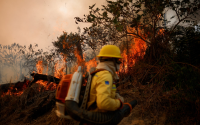17 December 2009Truthdig
Denmark is the home of renowned children's author Hans Christian Andersen. Copenhagen is dotted with historical spots where Andersen lived and wrote. "The Little Mermaid" was one of his most famous tales, published in 1837, along with "The Emperor's New Clothes."
As the United Nations' climate summit, called "COP 15," enters its final week, with more than 100 world leaders arriving amid growing protests, the notion that a binding agreement will come from this conference looks more and more like a fairy tale.
The reality is harsher. Negotiations have repeatedly broken down, with divisions between the global North, or industrialized countries, and the global South. Leading the North is the United States, the world's greatest polluter, historically, and a leader in per capita carbon emissions. Among the Southern nations are several groupings, including the least-developed countries, or LDCs; African nations; and nations from AOSIS, the Alliance of Small Island States. These are places where millions live on the edge, directly impacted by climate change, dealing with the effects, from cyclones and droughts to erosion and floods. Tuvalu, near Fiji, and other island nations, for example, are concerned that rising sea levels will wipe their countries off the map.
New conceptions of the crisis are emerging at COP 15. People are speaking of climate justice, climate debt and climate refugees. Indian scientist and activist Vandana Shiva was among those who addressed a climate justice rally of 100,000 Saturday in Copenhagen. Afterward, I asked her to respond to U.S. climate negotiator Jonathan Pershing, who said the Obama administration is willing to pay its fair share, but added that donors "don't have unlimited largesse to disburse." Shiva responded, "I think it's time for the U.S. to stop seeing itself as a donor and recognize itself as a polluter, a polluter who must pay. ... This is not about charity. This is about justice."
Shiva went on: "A climate refugee is someone who has been uprooted from their home, from their livelihoods, because of climate instability. It could be people who've had to leave their agriculture because of extended drought. It could be communities in the Himalayas who are having to leave their villages, either because flash floods are washing out their villages or because streams are disappearing."
Denmark is the home of renowned children's author Hans Christian Andersen. Copenhagen is dotted with historical spots where Andersen lived and wrote. "The Little Mermaid" was one of his most famous tales, published in 1837, along with "The Emperor's New Clothes."
As the United Nations' climate summit, called "COP 15," enters its final week, with more than 100 world leaders arriving amid growing protests, the notion that a binding agreement will come from this conference looks more and more like a fairy tale.
The reality is harsher. Negotiations have repeatedly broken down, with divisions between the global North, or industrialized countries, and the global South. Leading the North is the United States, the world's greatest polluter, historically, and a leader in per capita carbon emissions. Among the Southern nations are several groupings, including the least-developed countries, or LDCs; African nations; and nations from AOSIS, the Alliance of Small Island States. These are places where millions live on the edge, directly impacted by climate change, dealing with the effects, from cyclones and droughts to erosion and floods. Tuvalu, near Fiji, and other island nations, for example, are concerned that rising sea levels will wipe their countries off the map.
New conceptions of the crisis are emerging at COP 15. People are speaking of climate justice, climate debt and climate refugees. Indian scientist and activist Vandana Shiva was among those who addressed a climate justice rally of 100,000 Saturday in Copenhagen. Afterward, I asked her to respond to U.S. climate negotiator Jonathan Pershing, who said the Obama administration is willing to pay its fair share, but added that donors "don't have unlimited largesse to disburse." Shiva responded, "I think it's time for the U.S. to stop seeing itself as a donor and recognize itself as a polluter, a polluter who must pay. ... This is not about charity. This is about justice."
Shiva went on: "A climate refugee is someone who has been uprooted from their home, from their livelihoods, because of climate instability. It could be people who've had to leave their agriculture because of extended drought. It could be communities in the Himalayas who are having to leave their villages, either because flash floods are washing out their villages or because streams are disappearing."
Denis Moynihan contributed research to this column.






